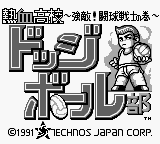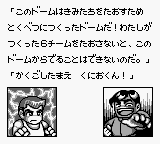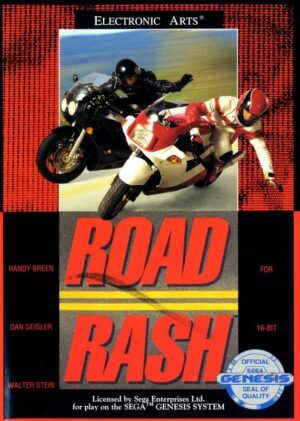Retro Replay Review
Gameplay
Nekketsu Kōkō Dodgeball Bu Kyōteki! Tōkyū Senshi no Maki retains the tight, addictive core of the original Super Dodge Ball while adapting it perfectly to the Game Boy’s portable format. Players command a three-on-three roster sourced entirely from Nekketsu High, each character boasting unique stats in speed, power, and technique. The side-scrolling court feels instantly familiar: you pass, throw, dodge, and catch with simple button inputs, but mastery comes from learning each teammate’s special moves and timing them for maximum effect.
(HEY YOU!! We hope you enjoy! We try not to run ads. So basically, this is a very expensive hobby running this site. Please consider joining us for updates, forums, and more. Network w/ us to make some cash or friends while retro gaming, and you can win some free retro games for posting. Okay, carry on 👍)
One of the biggest strengths of this sequel is its varied modes of play. The Tournament mode offers a structured progression through multiple schoolyard venues, pitting you against rival teams drawn from across the Kunio Kun universe. Versus mode, unlocked via link cable, transforms your Game Boy into a head-to-head battleground for local multiplayer matches that remain exciting long after the solo campaign is complete. Finally, Bean Bag mode switches up the rules—no outfield players and lower-scoring bean bag mechanics—providing a fresh strategic twist that encourages you to rethink positioning and ball control.
Strategy is at the heart of every dodge ball match here. You’ll need to balance aggressive throws with defensive tuning, deciding when to call in your strongest hitter or use a speedy runner to chase down errant balls. Special moves, like Kunio’s signature power throw or Riki’s lightning-fast dash, are earned by filling a meter through accurate passes and successful catches. Timing these abilities can turn the tide of a close match, making every goal, catch, or elimination feel earned and dramatic.
Graphics
On the monochrome Game Boy screen, character sprites are surprisingly detailed, with expressive animations that highlight each dodge, catch, and special move. Despite hardware limitations, the developers have managed to give Nekketsu High’s athletes distinct silhouettes—Kunio’s signature headband and Riki’s bulky build are instantly recognizable, even at the handheld’s low resolution. The ball itself is drawn clearly enough to track easily, ensuring that fast exchanges never feel confusing.
Backgrounds capture the lively atmosphere of school sports fields and gymnasiums, from cheering crowds rendered as simple pixel crowds to dynamic environmental touches like fluttering banners. Each venue has its own visual flair, whether it’s the iconic Nekketsu High courtyard or the shadowy exterior of a rival school at dusk. These varied settings break up the monotony of repeated matches and make each stage feel like its own mini-arena.
Menus and HUD elements are clean and intuitive, with easily legible stat bars and clear indicators for special move readiness. The sprite-based text also conveys playful personality—rival coaches taunt you with pixelated speech bubbles, adding a lighthearted narrative touch. Overall, the game’s presentation makes the most of the Game Boy’s capabilities, combining crisp sprites with fluid animations to deliver an engaging visual experience.
Story
While Nekketsu Kōkō Dodgeball Bu Kyōteki! Tōkyū Senshi no Maki is primarily focused on arcade-style sports action, it weaves in enough narrative to keep players invested. The loose storyline centers on the Nekketsu High dodge ball team’s quest to claim regional supremacy, facing off against familiar Kunio Kun rivals and mysterious new teams. Brief cutscenes—often no more than a few frames of pixel art and text—hint at rivalries, underdog triumphs, and moments of school spirit that give each match a sense of purpose.
Character interactions, though minimal, add charm. Between tournament rounds you’ll see quick chat exchanges: Kunio pumping up his teammates, Riki bragging about his power throws, and Coach Taka admonishing the squad to work together. These vignettes reinforce the game’s central theme of camaraderie and competition, making victories feel more satisfying and losses sting just a bit more.
Bean Bag mode introduces its own mini-narrative, framing the unique rules as part of a special school festival event. This light framing helps explain why the rules differ and gives players an added incentive to master this variant. Although there isn’t a sprawling plot, the game’s pacing, character charm, and well-chosen cutscenes ensure that every match feels like a meaningful chapter in Nekketsu High’s dodge ball saga.
Overall Experience
Nekketsu Kōkō Dodgeball Bu Kyōteki! Tōkyū Senshi no Maki stands out as one of the best handheld entries in the Kunio Kun dodge ball subseries. Its blend of accessible yet deep gameplay, variety of modes, and memorable character roster make it an addictive experience that’s easy to pick up but hard to put down. Whether you’re aiming for a high tournament ranking or engaging in heated link-cable showdowns, the game delivers consistently thrilling matches.
The portable format enhances its replay value: quick bouts are ideal for short commutes, and the link-cable functionality fosters friendly rivalry. Bean Bag mode acts as an unexpected treat, shaking up familiar mechanics and rewarding players who appreciate strategic nuance. Even years after its release, this Game Boy sequel holds up as a testament to how well-designed sports action can transcend hardware limitations.
For fans of the original Super Dodge Ball or newcomers seeking an engaging portable sports title, Nekketsu Kōkō Dodgeball Bu Kyōteki! Tōkyū Senshi no Maki remains a standout choice. It captures the spirit of Japanese high school sportsmanship, balances competitive depth with pick-up-and-play accessibility, and showcases the enduring charm of the Kunio Kun universe. Strap on your headband, warm up your arm, and get ready to dodge, catch, and launch your way to victory.
 Retro Replay Retro Replay gaming reviews, news, emulation, geek stuff and more!
Retro Replay Retro Replay gaming reviews, news, emulation, geek stuff and more!









Reviews
There are no reviews yet.